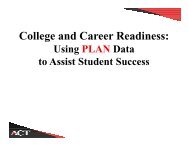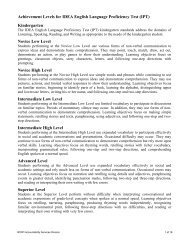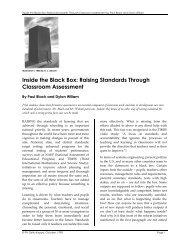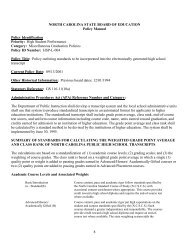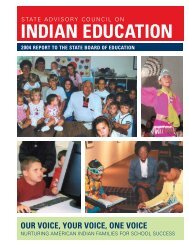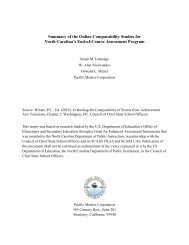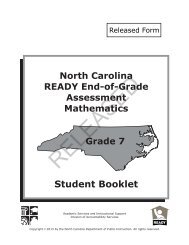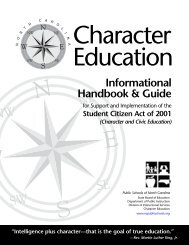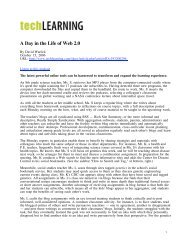Parent and Family Involvement - Public Schools of North Carolina
Parent and Family Involvement - Public Schools of North Carolina
Parent and Family Involvement - Public Schools of North Carolina
Create successful ePaper yourself
Turn your PDF publications into a flip-book with our unique Google optimized e-Paper software.
HOW SCHOOLS CAN OVERCOME OBSTACLES TO FAMILY INVOLVEMENT<br />
Appendix E<br />
Roadblock:<br />
Detour:<br />
Roadblock:<br />
Detour:<br />
Roadblock:<br />
Detour:<br />
Roadblock:<br />
Detour:<br />
Roadblock:<br />
Detour:<br />
Some parents believe they have talents but don’t know whether they are<br />
needed or how to contribute to the school or the PTA.<br />
Don’t wait for parents to <strong>of</strong>fer to help; seek them out. Suggest a few<br />
different but specific options or ways they could volunteer. Create a list<br />
<strong>of</strong> specific volunteer actions that are needed from parents. Ask all<br />
parents/caregivers what they would like to do in the school. Discuss <strong>and</strong><br />
form realistic expectations to more effectively use parents’ many talents.<br />
Many parents are unfamiliar with the system <strong>and</strong> therefore do not know what<br />
their rights are or how they can become involved.<br />
Create a simple, short parent h<strong>and</strong>book covering school rules, procedures,<br />
policies, <strong>and</strong> where to find answers to questions. Use pictures or visuals as<br />
much as possible. Include names <strong>and</strong> numbers <strong>of</strong> contact people who can<br />
answer questions in specific areas. Include pictures <strong>and</strong> names <strong>of</strong> school<br />
administrators, staff, teachers, PTA <strong>of</strong>ficers, <strong>and</strong> other contact people.<br />
<strong>Parent</strong>s without adequate resources <strong>of</strong>ten feel overwhelmed. Families suffering<br />
from economic stress must address their own needs for food, clothing, <strong>and</strong><br />
shelter before they can see clearly how to become more involved in their<br />
children’s education.<br />
Ask the parent or guardian about their situation <strong>and</strong> listen to them. Assign<br />
a “buddy” who underst<strong>and</strong>s the situation or language to help connect<br />
the family to the school. Provide information to help parents access <strong>and</strong><br />
secure the health <strong>and</strong> social services they need for themselves <strong>and</strong> their<br />
families. Work out agreements with social service <strong>and</strong> health agencies to<br />
provide services at the school through school-based clinics or near the school<br />
in community-based clinics. Develop <strong>and</strong> distribute to parents a directory<br />
containing information on available services <strong>and</strong> resources in the community<br />
<strong>and</strong> how to access them. Meet the families’ personal needs, then help the<br />
parents become involved in the education <strong>of</strong> their children.<br />
Child care may not be <strong>of</strong>fered at meetings or school functions. <strong>Parent</strong>s may be<br />
discouraged from brining their children to events.<br />
Find an available room <strong>and</strong> available caregivers for child care at meetings.<br />
Ask members <strong>of</strong> the school’s parent organization, community members, school<br />
service clubs, or other parents to volunteer to provide child care on a rotating<br />
basis. Hire high school or college students in child development classes or<br />
child-care pr<strong>of</strong>essionals in the community to provide child care <strong>and</strong>, if<br />
appropriate, charge parents a nominal fee. Adhere to state-m<strong>and</strong>ated<br />
child/adult ratios to provide safe, quality care.<br />
<strong>Parent</strong>s who don’t speak English may not underst<strong>and</strong> newsletters, fliers, or<br />
speakers at meetings.<br />
Provide printed materials that are sent home <strong>and</strong> passed out at meetings in all<br />
languages spoken by the families in the school. Identify <strong>and</strong> help secure<br />
interpreters <strong>and</strong> translators for workshops <strong>and</strong> meetings. Hold group activities<br />
<strong>and</strong> social times in the same room as English-speaking families <strong>and</strong> then have<br />
46



